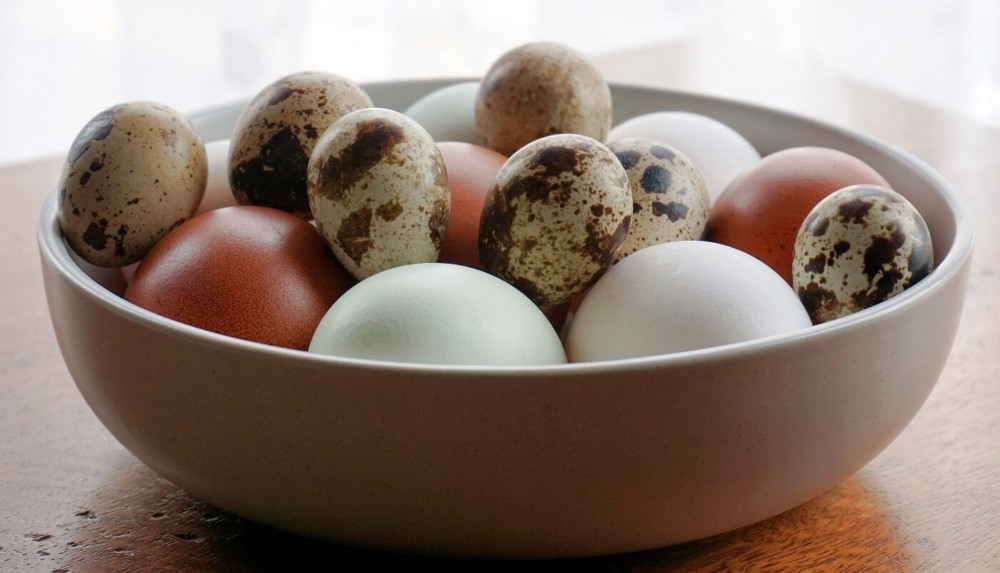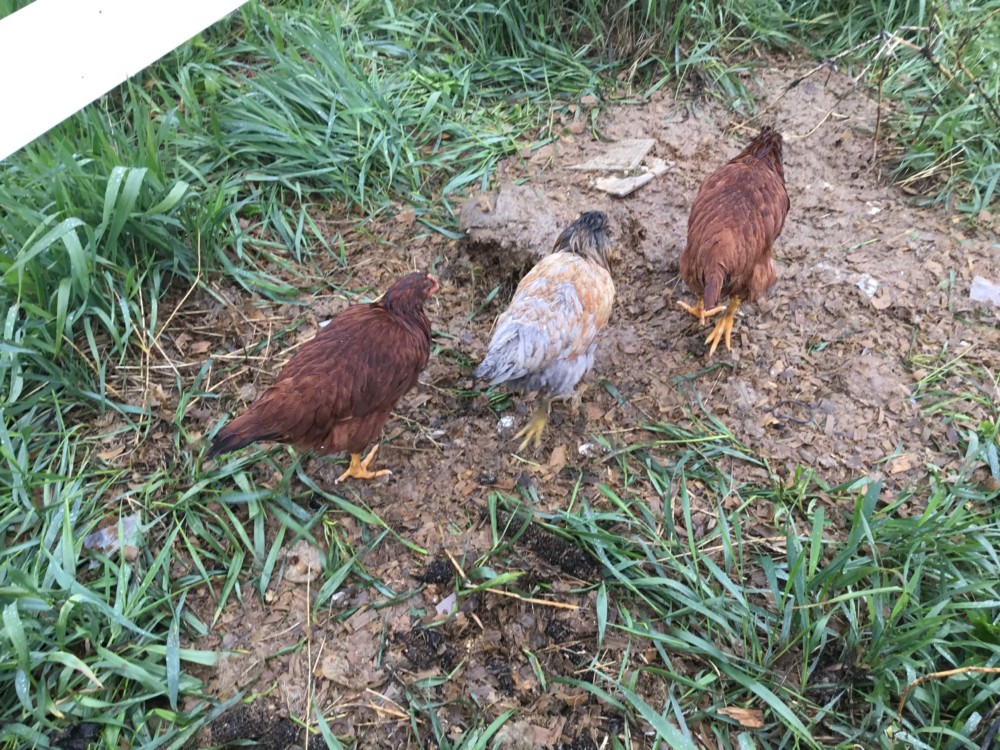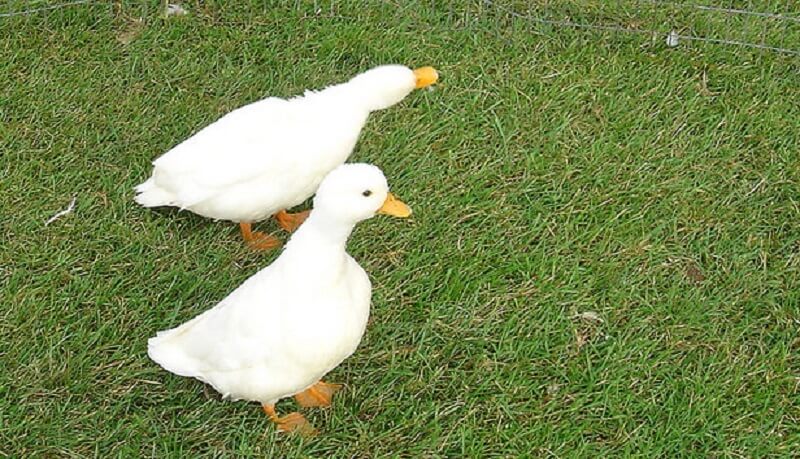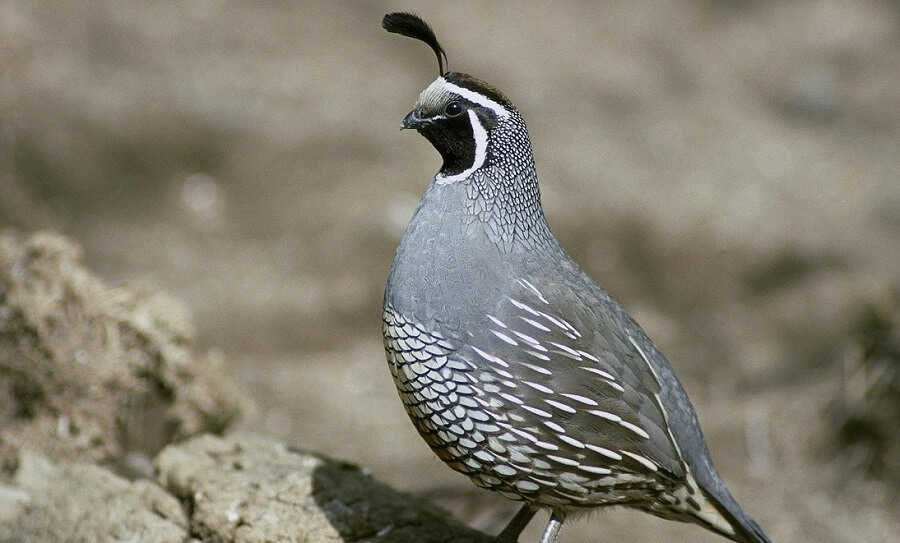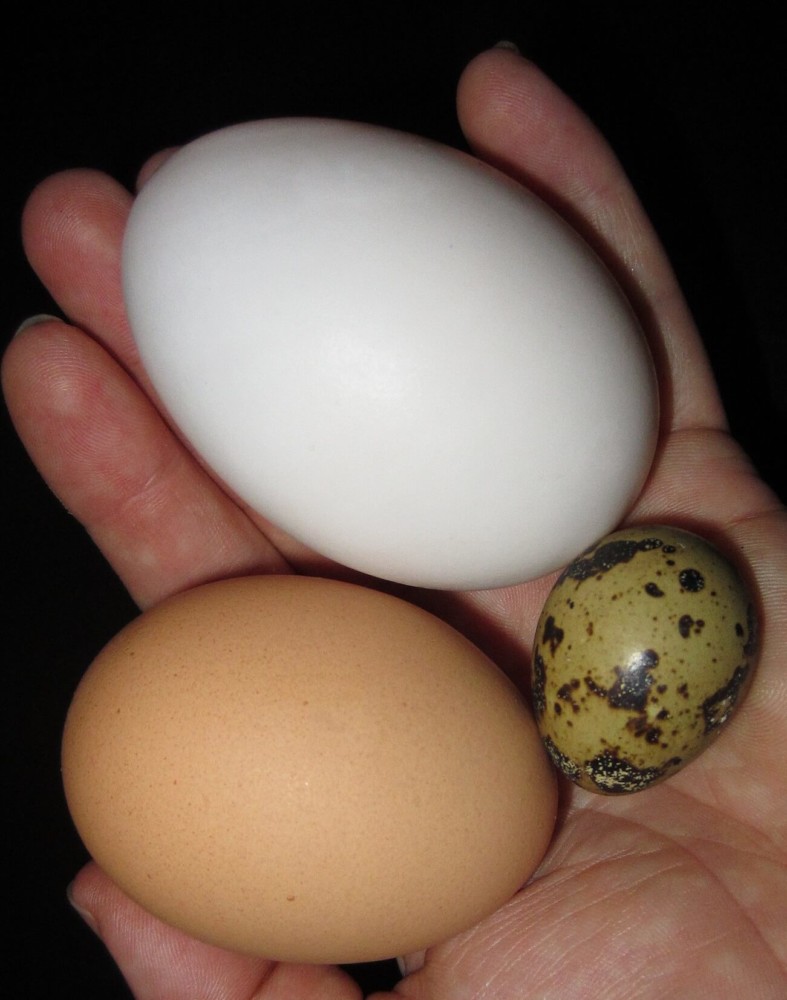If you are thinking about raising birds for eggs, you may be considering between quail, chicken, or ducks. Which is best? Which bird is easiest to raise and which is the most affordable?
These are a few of the questions I set out to answer in this guide.
There are specific benefits to each bird and it depends on your specific circumstances and preferences.
In this guide, I will cover:
- Nutritional comparison of quail, chicken, and ducks
- Space requirements of each quail, chicken, and duck
- Health resistance to disease, illness, and early dying
- Affordability of feed-to-food ratio
Nutritional Facts Comparing Quail, Chicken, and Duck Eggs
There are two ways to look at the nutritional facts of quail, chicken, and duck eggs. First, you can compare egg-to-egg facts, but it’s important to understand that quail eggs are significantly smaller than chicken eggs. Duck eggs are larger than chicken eggs.
Nutritional Chart of A Quail Egg, Chicken Egg, and Duck Egg
| Quail Eggs
9 grams |
Chicken Eggs
49 grams |
Duck Eggs
70 grams |
|
| Omega 3 | 4 mg | 37 mg | 71.4 mg |
| Omega 6 | 84.6 mg | 570 mg | 391 mg |
| Vitamin A | 48.9 IU | 241.9 IU | 472 IU |
| Vitamin B6 | 0.01 mg | 0.1 mg | 0.2 mg |
| Vitamin B12 | 0.1 mcg | 0.65 mcg | 3.8 mcg |
| Vitamin D | 4.95 IU | 17.38 IU | 52 IU |
| Vitamin E | 0.1 mg | 0.49 mg | 0.9 mg |
| B1- Thiamin | 0.01 mg | 0.04 mg | 0.1 mg |
| B3 – Niacin | 0.01 mg | 0.04 mg | 0.1 mg |
| Riboflavin | 0.1 mg | 0.2 mg | 0.3 mg |
| Pantothenic | 0.2 mg | 0.71 mg | 1.3 mg |
| Folate | 5.9 mcg | 23.31 mcg | 56 mcg |
| Cholesterol | 76 mg | 210 mg | 619 mg |
| Calcium | 5.8 mg | 41 mg | 44.8 mg |
| Choline | 23.7 mg | 124.7 mg | 184 mg |
| Selenium | 2.9 mg | 15.75 mg | 25.5 mg |
| Protein | 1.2 g | 6.25 g | 9 g |
| Iron, FE | 0.33 mg | 0.9 mg | 2.7 mg |
| Phosphorus | 20.3 mg | 94.8 mg | 154 mg |
| Zinc | 0.1 mg | 0.55 mg | 1 mg |
The average quail egg is about 9 grams, while the average large chicken egg is 49.7 grams. It takes 5-6 quail eggs to equal one chicken egg. Duck eggs are about 1.5 times the size of a large chicken egg. So 3 chicken eggs equal about 2 duck eggs.
That also means that it takes between 15 and 16 quail eggs to equal 2 duck eggs.
Another way you can compare nutritional facts between quail, chicken and duck eggs is to compare nutrition according to the same amount of egg.
I have created a nutritional chart that compares the same serving size of eggs. Since it’s hard to split chicken eggs into 1.5, I charted everything according to 2 duck eggs.
Nutritional Chart For Equal Amounts Of Quail, Chicken And Duck Eggs
| 16 Quail Eggs
144 grams |
3 Chicken Eggs
147 grams |
2 Duck Eggs
140 grams |
|
| Omega 3 | 64 mg | 111 mg | 142.8 mg |
| Omega 6 | 1353.6 mg | 1710 mg | 782 mg |
| Vitamin A | 782.4 IU | 725.7 IU | 944 IU |
| Vitamin B6 | 0.16 mg | 0.3 mg | 0.4 mg |
| Vitamin B12 | 1.6 mg | 1.95 mg | 7.6 mg |
| Vitamin D | 79.2 IU | 52.14 IU | 104 IU |
| Vitamin E | 1.6 mg | 1.47 mg | 1.8 mg |
| B1 – Thiamin | 0.16 mg | 0.12 mg | 0.2 mg |
| B3 – Niacin | 0.16 mg | 0.12 mg | 0.2 mg |
| Riboflavin | 1.6 mg | 0.6 mg | 0.6 mg |
| Pantothenic Acid | 3.2 mg | 2.13 mg | 2.6 mg |
| Folate | 94.4 mcg | 69.93 mcg | 112 mcg |
| Cholesterol | 1216 mg | 630 mg | 1238 mg |
| Calcium | 92.8 mg | 123 mg | 89.6 mg |
| Choline | 379.2 mg | 374.1 mg | 368 mg |
| Selenium | 46.4 mcg | 47.25 mcg | 51 mcg |
| Protein | 19.2 g | 18.75 g | 18 g |
| Iron, FE | 5.28 mg | 2.7 mg | 5.4 mg |
| Phosphorus | 324.8 mg | 284.4 mg | 308 mg |
| Zinc | 1.6 mg | 1.65 mg | 2 mg |
As you can see, for most vitamins and nutrients, duck eggs pack a greater punch for the amount of food you eat. One of the reasons for this is because duck eggs have a higher proportion of yolk to whites per egg.
Be aware though, that duck eggs have twice the recommended daily allowance of cholesterol. If you have high cholesterol or heart disease, you will want to shy away from eating many duck eggs.
Just in case you are a little unsure of what eat nutrient does here’s a quick recap of the main benefits of the vitamins and nutrients you find in these eggs.
- Omega 3: Brain function, helps prevent heart disease, lowers blood pressure
- Omega 6: Brain function, stimulate skin and hair growth, maintain bone health, helps reproductive system, regulates metabolism
- Vitamin A: Vision, helps the immune system, helps heart, kidneys and other organs
- Vitamin B6: Creation of red blood cells, neurotransmitters, helps nerves and skin health
- Vitamin B12: Helps prevent anemia, helps with nerve and blood cells healthy, mood
- Vitamin D: Helps the body absorb calcium, protects against osteoporosis, helps with immune support
- Vitamin E: Protects cells from free radicals, immune support, skin health, cell health
- B1 – Thiamin: helps with glucose metabolism, nerve, muscle, heart function
- B3 – Niacin: Vital to every function in the body, lower cholesterol, ease arthritis, boost brain function
- B2 – Riboflavin: Helps break down protein, fats, and carbohydrates, helps maintain the body’s energy supply
- B5 – Pantothenic Acid: One of the most important vitamins, required for blood cells, helps convert food into energy, healthy skin, eyes, and hair, nervous system
- Folate: Required for DNA and genetic material, necessary for cells to divide
- Cholesterol: Helps to reduce bad cholesterol from your bloodstream
- Calcium: Strong bones, helps the blood to clot,
- Choline: Helps memory, muscle control, and nervous system functions
- Selenium: Reproduction health, thyroid function, protects from free radicals
- Protein: Helps build muscles, bones, cartilage, and repair tissue,
- Iron, FE: Helps transport oxygen in the blood, increases energy, better athletic performance
- Phosphorus: Works with B vitamins, helps the body to store energy
- Zinc: Helps wounds to heal, helps with taste and smell
Some of these nutrients are best for you in smaller doses and eggs provide that!
Which Birds Are Best For Small And Large Areas?
Quail, chickens, and ducks all have different living requirements. It’s important to take their various needs into consideration when you are deciding which bird to raise.
There are various things to consider. The amount of space you have to raise birds is an important consideration. Another is your weather.
Space Requirements of Quail, Chicken, and Ducks
Quail are much smaller than chickens and ducks. Because of that, they need a lot less space to be happy and healthy than chickens or ducks.
For centuries, quail have been raised primarily for meat production. Only since World War II have quail been more widely raised and bred for egg production.
Even so, quail are raised in many areas of the world in cages set in apartments, garages, and other confined spaces.
Quail need about 1 square foot of space per bird. They do well in stacked cages as long as the cages are kept clean and sanitary.
Most cities in the USA allow the raising of quail without additional permission.
Quail can also free-range, but they still need to be kept caged. If they free-range, they need either a tractor or a large cage with a high roof. Otherwise, quail are more likely to fly free and away as they get older.
Chickens have more space requirements than quail do. Chickens generally need 2-3 feet per bird in a chicken coop and 8-10 square feet of space in a chicken run.
Chickens can do well in a suburban backyard and in a free-range environment. Some chicken breeds will do ok in a more confined space such as a city lot but may need to be fed commercial feed if they don’t have enough space to forage for food.
Some cities have restrictions on raising chickens, but every year more cities pass ordinances allowing chickens to be raised under certain guidelines.
Often this means that roosters aren’t allowed and there may be flock size limitations per family.
Ducks need an average of 15 sq feet of space per bird. They are larger than chickens and have a longer wingspan. Ducks also need adequate water.
Although they don’t need to have a pond or a pool, they do need enough water that they can submerge their beaks into it when they eat.
And they will spill the water and their feed everywhere.
Except for Mallards, most domestic duck breeds don’t fly that great so you won’t have as many adventures keeping them contained in your yard as you will chickens. A short 1 or 2-foot fence will contain them.
Ducks will also free-range, but tend to leave mature plants alone. This works great for gardeners.
In my research, I’ve also noticed that more cities address raising chickens (either allowing or banning it) than address raising ducks. So you’ll want to check on your own city’s rules if you plan to raise ducks.
- Quail need 1 sq foot per bird
- Can free-range or be kept in cages in apartments, garages, or sheds
- Most cities allow quail raising
- Chickens need 2-3 sq feet of space in a coop and 8-10 sq feet of space in a chicken run
- Most breeds of chicken can free-range well
- Roosters may be banned inside city limits
- Ducks need 15 square feet per bird
Living Needs of Quail, Chicken, and Ducks
In addition to space requirements, each bird has different needs to be happy and healthy.
Quail probably have the fewest needs as they can be healthy in a cage or a hatch. They will usually need to be fed a wild game bird feed, even if they are allowed to free-range. This will be the biggest expense you will have with quail. This game bird feed is one of the lowest cost feeds available on Amazon but does a good job of delivering good nutrition for quail and turkeys. It costs a little over $8 for a 5 lb bag.
- Hutch, cage, or another encasement
- Wild game bird feed
- Calcium such as oyster shells
Chickens need to have a safe place to roost at night. They need a secure coop that is draft-free. Chickens are more at risk of predators and an entire flock can be massacred in a single night if they don’t have good protection.
A good fright can also scare hens into ceasing egg production.
Chickens need a place to roost off the ground. A simple 2×4 3 or 4 feet above the groundworks great. If chickens roost on the ground, they are more likely to catch a chill and get sick.
Chickens can free-range, but in my experience will probably still need some supplemental feed once a day to maintain good egg production.
Chickens need access to shelter from rain and sun and constant access to water.
- Safe and secure chicken coop
- Supplemental feed if free-ranging
- Access to shelter during the day.
Ducks have different needs. They don’t need as secure of a coop. Ducks are happy in rickety shelters. They love to have great ventilation and don’t need protection from the wind and rain as much as chickens.
They love bad weather! Rain, snow, they love it all! Ducks do need water. They don’t do well on the nipple waterers that chickens tend to like. They need a place to clean out their nostrils when they eat.
If they don’t have a way to do this, they are more likely to choke on their food or get infected in their sinuses. Ducks don’t need a roost. THey will nest on the ground and be perfectly happy.
One thing ducks don’t need, but will love is a pond or a pool to splash and play in. Even in the winter, they will love this luxury.
- Duck Houses can be old sheds, dog houses, and don’t need to be as secure
- Ducks don’t need high fences to be contained because they don’t fly like chickens
- Ducks need water to submerge their heads in when they eat
Health Hardiness of Quail, Chicken, and Ducks
Generally speaking, the larger the bird, the hardier and healthier it is. This is true of quail, chickens, and ducks.
Quail can scare easily. Loud noises can frighten quail and cause them to fly upward into their cage’s roof and knock themselves dead. They can also have a heart attack from fright and die easily.
There are so many little things that can cause sudden death in quail. They are more of a scaredy “chicken” than chickens are. Because they are smaller, it is easier for them to get sick from exposure, illness, or other health issues and die suddenly.
Their little bodies just don’t handle stress as well.
Chickens are hardier than quail. They seldom scared to death, but I’m sure it has happened somewhere.
They run if frightened and can put up a lot of noise if scared, but generally do well with sudden noises, loud noises, and visitors.
For the most part, chickens are fairly hardy. They don’t really need a lot of vaccinations unless they are exposed to new birds frequently or have exposure to wild birds.
I always recommend isolating new birds to a flock for 3 weeks before adding them into a flock. This helps to identify sick birds before you infect your existing flock.
Chickens can get worms and mites. They can also get tics and have several health issues you want to watch for.
The exact hardiness of each bird will depend on its breed. There is a wide range of breeds that are more fragile to more hardy.
But, even the hardy chicken breeds are generally surpassed by the hardiness of ducks.
Chickens as a whole are more susceptible to moist air and respiratory ailments. They are also at risk if they get wet and cold for extended periods of time.
Chickens are more predator vulnerable than ducks and will usually get sick more often than ducks. Many bird illnesses that chickens get rarely ever get passed onto ducks.
Ducks are the hardiest of these three birds. They rarely get sick.
They do very well in super cold conditions and in wet conditions. Ducks simply don’t get sick as often in extreme weather.
Ducks even do better in hot conditions than many chicken breeds. Plus, they tend to lay eggs more consistently than chickens do throughout the year.
Ducks can get sick, but most of the health concerns of ducks are rare.
- Quail can frighten to death
- Chickens are hardier than quail, but still more likely to get sick than ducks
- Ducks are the hardiest of the three birds and do the best in wet, cold and hot conditions.
What Costs Less: Quail, Chicken, or Ducks?
Quail eggs tend to cost less per egg than either chicken or duck eggs. However, quail eggs are much smaller. So if you want to compare apples-to-apples, then it’s best to compare per egg gram so that equal amounts of an egg are compared.
I broke it down in this chart so it would be easier to see the costs.
| Quail | Chickens | Ducks | |
| Food per Day | 14 grams – 18 grams per day | 35 – 60 g per day (depending on breed) | 170-200 g per day |
| Average Feed Per Year | 16 g x 365 days = 5,840 grams a year | 48 g ave x 365 days = 17,520 g per year | 185 g ave x 365 days = 67,525 g per year |
| Cost per bag* | $8.50+ for 5 lbs
= 2,268 grams |
$27.50 for 25 lbs*
= 11,340 grams |
$61.50 for 40 lbs*
=18,143 grams |
| Cost Per Gram | $0.0037
($8.50 / 2,268) |
$0.0024
(27.50 / 11,340) |
$0.0034
(61.50 / 18,143) |
| Cost per year per bird | Approx $21.90 per bird. (0.0037 x 5,840) | Approx $42.49
(0.0024 x 17,520) |
Approx $229.58
(0.0034 x 67,525) |
| Average egg size | 9 grams | 49 grams | 70 grams |
| Average eggs per day | 180-200 eggs a year | 280+ depending on breed. More for some | 180+ eggs a year depending on breed |
| Average cost per egg | $21.90 / 180 eggs
= $0.12 per egg |
$42.49 / 280 = $0.1517 | $229.58 / 180 = $1.275 |
| Average cost per egg gram | $0.12 / 9 g = $0.013 per egg gram | $0.1517 / 49 g = $0.003 per egg gram | $1.275 / 70 g = $0.018 per egg gram |
There are a few things to note. First, the cost of feed varies greatly. I used examples of feed that I could find on Amazon, but I buy a chicken and duck feed at my local CalRanch for $13 that is a 25 lb bag.
At those costs, the cost per egg for both chicken and ducks drastically decreases making the duck eggs even cheaper than chicken eggs and both much cheaper than the quail eggs (per egg gram).
Other Factors To Consider Between Quail, Chicken, and Ducks
There are a lot of other differences between quail, chicken and duck eggs. Generally speaking, most people report that quail eggs taste fairly similar to chicken eggs. Duck eggs have a stronger and “creamier” taste than chicken eggs. Both quail and duck eggs have a higher proportion of yolk to egg whites than chicken eggs have.
Some people who are allergic to chicken eggs can eat duck eggs. But, the opposite is true also. Some people are allergic to duck eggs, but not chicken eggs.
Duck eggs are often preferred by bakers because they have more albums than chicken eggs. That makes the baked goods fluffier and lighter than when chicken eggs are used.
You can’t just substitute 1 duck egg for a chicken egg. The same thing goes for quail eggs. Generally, you will need to sub 2 duck eggs for 3 chicken eggs in a recipe. Smaller amounts of eggs will need to be experimented with so you are familiar with how to split the duck eggs up.
For 3 chicken eggs, you will need to eat or sub out 16 for 2 chicken eggs. I would also experiment with baked goods and recipes because quail eggs will make the end result a little different.
Quail eggs have a hard shell and are usually harder to crack than either chicken or duck eggs. You can purchase a special quail egg cutter to open quail eggs.
Duck eggs also have a harder shell, but can be cracked normally. They just don’t usually produce as “clean” of a crack as a chicken egg does.
Duck and quail eggs have a little longer (about 2-3 weeks) shelf life than chicken eggs.
All eggs can be tested for being still good by using the “float” test. Simply place an uncooked egg in a bowl of water. If the egg floats, it is bad and should be thrown away. If it sinks, it is still good to eat. If it floats halfway up in the bowl, it should be eaten very soon.
- Some people who are allergic to chicken eggs can eat duck eggs
- Duck eggs have a thicker shell than chicken or quail eggs, which gives them a longer shelf life
- Duck eggs have more albumen than chicken eggs
- Duck eggs taste creamier
- Duck eggs have a thicker shell and waxy coating that protects them from water
- Duck eggs have less water, which can make them more rubbery if they are overcooked
- Duck egg whites are harder to whip because of the lower water content
- You’d need to eat 5 quail eggs to equal one chicken egg in your daily breakfast
- Quail eggs come beautifully white with black spots or off-white
- Chicken eggs come green, blue, brown, dark brown, white and off-white
- Duck eggs come white, off-white, and black
- Ducks poop everywhere. Wet, splattery poop.
Conclusion
As you can see, there are a lot of differences between duck, chicken, and quail eggs. If you have space and inclination, ti can be fun to try raising each bird and to test which type of eggs your family enjoys the best.
If you only have the space, patience, or spirit of adventure to try just one, then pick the one that fits your personal circumstances the best depending on the space you have and your weather.
Related Articles
How To Raise Ducks: The Complete Guide for Beginners
What Food Do Chickens Eat? How To Save On Feed Costs
The Complete Guide To Raising Quail
7 Superstar Chicken Breeds That Lay Over 300 Eggs A Year
Resources
http://pennstatehershey.adam.com/content.aspx?productid=107&pid=33&gid=000317
https://nutritiondata.self.com/facts/dairy-and-egg-products/111/2
https://nutritiondata.self.com/facts/dairy-and-egg-products/126/2
https://nutritiondata.self.com/facts/dairy-and-egg-products/128/2
My Favorite Chicken and Duck Supplies
This list contains affiliate products. Affiliate products do not cost more but helps to support BestFarmAnimals and our goal to provide farm animal owners with accurate and helpful information.
Manna Pro Oyster Shell keeps eggs strong. Before I gave my chickens oyster shell, I had the oddest eggs, many with weak and irregular shells. Now, I don’t have an issue.
Layer Feed by Manna Pro. I like pellets rather than crumbles as my chickens eat them better and less gets wasted or scavenged by rodents. A good layer feed makes the difference in hens laying many more eggs.
My chickens love this mealworm treat, which gives added protein, something that’s great during molting and winter months.
There are many ways to feed and water your chickens. I like this food and water setup the best because it reduces waste, saves me time feeding and watering, and keeps the food fresh longer. Except, in the winter, I use a heated waterer. The only problem is the heated waterers need to be replaced every few years.
I love this chicken veggie hanger. It makes it easy to give your chickens produce from the garden and keep them occupied in the winter with a fresh head of lettuce.
These chicken toys are a hoot! They will help curb bullying and keep your chickens active, especially in the winter when hens tend to get more lethargic.

